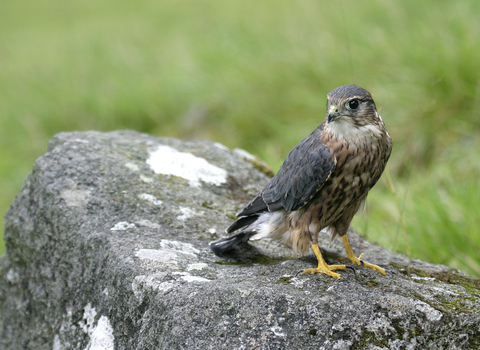
©Wildstock
Merlin
Our most diminutive falcon, the merlin is a pretty bird of prey. It chases small birds, flying low to the ground or hovering in the breeze because of its small size. Resident merlins are joined in winter by Icelandic migrants.
Scientific name
Falco columbariusWhen to see
January to DecemberSpecies information
Category
Statistics
Length: 26-31cmWingspan: 56cm
Weight: 180-230g
Average lifespan: 3 years
Classified in the UK as Red under the Birds of Conservation Concern 5: the Red List for Birds (2021). Protected in the UK under the Wildlife and Countryside Act, 1981.
About
The merlin is a small falcon, not much bigger than a blackbird. Merlins feed on small birds, especially meadow pipits which they chase in flight, low to the ground. Their small size also allows them to 'hang' in the breeze as they pursue their prey. They nest on the ground, among the heather. In the winter, our merlin population increases as breeding birds are joined by migrants from Iceland in search of warmer climes.How to identify
Male merlins are blue-grey above, with a grey head and orangey-cream underparts that are streaked in black. Females are mainly grey-brown, with dark streaking underneath. Merlins have blunt tails and compact, broad-based wings that are pointed at the tip.Distribution
Nests on moorlands in North and South West England, Wales and Scotland; winters on coastal marshes and farmland in the lowlands.In our area
Merlin are regular migrants and overwintering birds of prey on the Isle of man.
Did you know?
The merlin is the smallest European falcon. Its diminutive size made it a popular choice for lady falconers and was used in the 20th century for lark-hawking.Merlin are regular migrants and overwintering birds of prey on the Isle of man.
